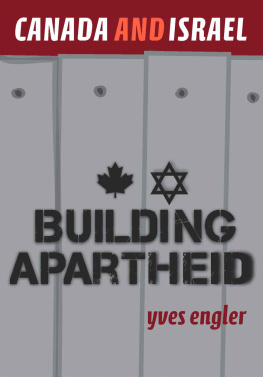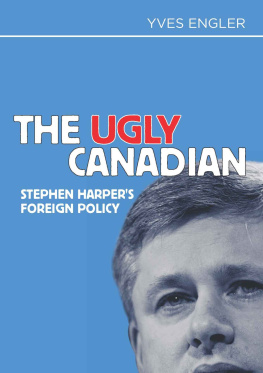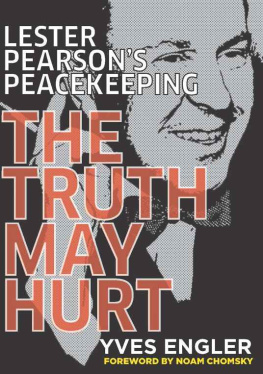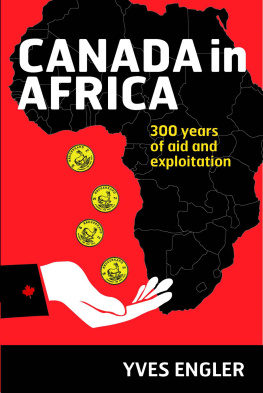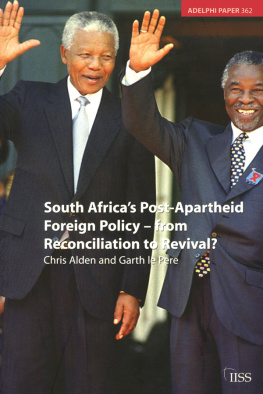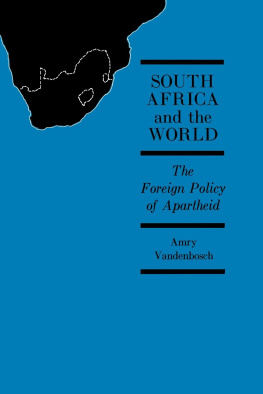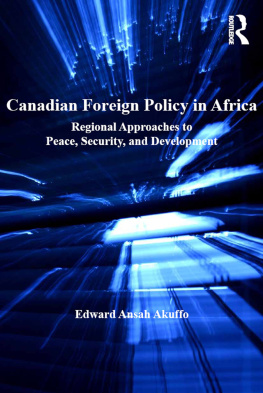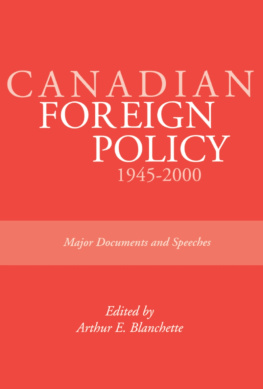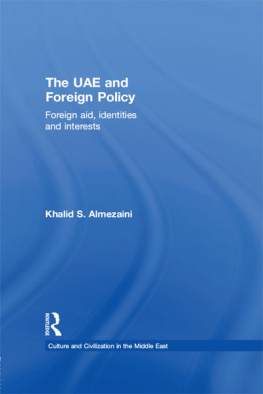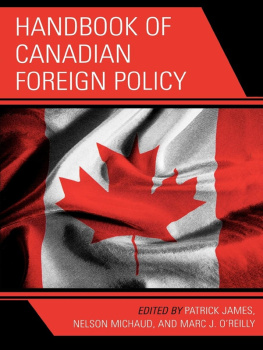The Black Book
of Canadian Foreign Policy
By
Yves Engler
Fernwood Publishing, RED Publishing
in association with The Dominion (www.dominionpaper.ca)
Copyright 2009 Yves Engler
All rights reserved. No part of this book may be reproduced or transmitted in any form by any means without permission in writing from the publisher, except by a reviewer, who may quote brief passages in a review.
First printing April 2009
Cover design Working Design
Printed and bound in Canada by Transcontinental Printing
A co-publication of
RED Publishing
2736 Cambridge Street
Vancouver, B.C. V5K 1L7 and
Fernwood Publishing
32 Oceanvista Lane
Black Point, Nova Scotia B0J 1B0
and 8 - 222 Osborne Street, Winnipeg, Manitoba R3L 1Z3.
www.fernwoodpublishing.ca



Fernwood Publishing Company Limited gratefully acknowledges the financial support of the Department of Canadian Heritage, the Nova Scotia Department of Tourism and Culture and the Canada Council for the Arts for our publishing program.
Library and Archives Canada Cataloguing in Publication
Engler, Yves, 1979-
The black book of Canadian foreign policy / Yves Engler.
Includes bibliographical references.
ISBN 978-1-55266-314-1
1. Canada--Foreign relations. I. Title.
FC242.E53 2009 327.71 C2009-901313-4
Introduction
Certain things come to mind for most of us when thinking about Canadian foreign affairs: We are a nation of peacekeepers. The world needs more Canada. Nobel Peace Prize winner Lester Pearson. By far the most typical foreign-policy story on television, radio or print is one of generous Canadians helping children in some poor corner of the world and most of us are only exposed to this narrative. This is why citizens of the Great White North overwhelmingly believe Canada is a force for good in the world. Numerous studies have found that Canadians self-appraisal of their countrys foreign policy is more positive than any other country. A March 2007 poll found that 84 percent of Canadians believed Canada played a positive role on the world stage while 10 percent felt it was negative.1 According to a survey released in June 2005, by the U.S.-based Pew Research Center Global Attitudes Project, 94 percent of Canadians believed their country was well liked around the world, the highest percentage of 16 nations surveyed.2
A common assumption is that Canadians make peace while Americans go to war. It is undoubtedly true that our country has not and does not behave as badly (judged by the use of might-makes-right policies) on the world stage as the USA. But that is damning with faint praise indeed. And it is also true (if we ignore our colonial policy towards First Nations) that Canadians need not share the embarrassment of citizens of France, England, Japan, Germany, Spain, Portugal, Russia, Belgium, the Netherlands and more, over their countries colonial past. But, should we really be so proud of our countrys foreign affairs that we wear Canadian flags on our backpacks when traveling abroad?
To answer that question we need to ask more questions: Is Canadas record really as good as most Canadians think? Was Canada forced to take sides with an imperial USA as a result of the war on terror or the Cold War? Does an ever more integrated North American economy mean Canada has lost whatever independence it once had in foreign affairs? Did we ever really have an independent foreign policy? How much influence does Canadas military-industrial complex have over this countrys foreign policy? Do Canadian corporations act any differently than American companies when it comes to their desire for maximizing profits on foreign investments? How much of our foreign policy is designed to serve the interests of the relatively few people who own Canadian corporations active abroad? Do those of us with pensions or RRSPs invested in Canadian corporations operating abroad also share responsibility when people are poisoned by a mine, or rivers are destroyed by oil exploration?
Events in Haiti made me question Canadas peacekeeper self-image. Canada helped overthrow the democratically elected Haitian government of Jean-Bertrand Aristide in February 2004 and then supported an interim illegal government that killed thousands. When I first learned about the situation in Haiti I assumed Canadian diplomats had simply followed Washington, not fully understanding the consequences of their actions. But as I learned about the extent to which Canada participated in this crime against the Haitian people I began to question my assumptions of Canadas role in the world. While acting in concert with the USA, it was clear that Canada was also an independent player with its own self-interests, including those of Canadian companies. Seeing Canada simply as a junior partner with the USA did not adequately explain our role in overthrowing the elected Haitian government or our ongoing relationship with that country. Was Haiti an anomaly? Or has Canada used its wealth and power to act like an imperial bully elsewhere?
I decided to devote my time to reading everything I could find about Canadian foreign policy. If you know where to look, theres a vast amount of material about Canadas role around the world.
I am not a foreign policy expert or veteran diplomat; I have never worked as foreign correspondent for a major media outlet. Instead, I am a moderately well educated, politically active, independent journalist and author. I believe Earth is our home and we are its stewards. While citizens of Canada, we are also neighbours to everyone who shares this planet. We must be good neighbours. That should be the underlying premise of Canadas foreign policy. This book is aimed at people who share this basic political viewpoint and who also believe that democracy requires citizens to keep themselves informed about what their government is doing. Canadians have a right and a responsibility to know, debate and ultimately shape what is being done in our name around the world.
Informing citizens about what their governments, corporations and other institutions are doing is a central task of journalists. In order for our government to be held to even minimal standards of democracy Canadians must know what our institutions are doing. If a mining company based in Vancouver destroys a watershed in Ecuador, we are not being good neighbours. If a Canadian-funded NGO works with the U.S. National Endowment for Democracy to destabilize a government that favours its citizens interests over those of giant corporations, we are not being good neighbours. If the Canadian government takes part in a military campaign designed to subordinate the interests of a country or region to ours and the USA, we are being terrible neighbours.
The chapters that follow discuss examples of Canadas role in various regions of the world as well as in international organizations. When reading, please think about the following questions: Is this what a good neighbour would do? Are we really a force for good in the world? Have our government policies been as they should be or must citizens demand change?
Unfortunately, most of us pay more attention to the words than to the deeds of our governments and corporations. Much of the media has abdicated its responsibility in favour of some combination of entertainment and cheerleading for the rich and powerful. Nowhere is this more true than in the realm of foreign policy. The foreign affairs establishment, the military and corporate interests dominate discussion of Canadas role in the world.
Next page

